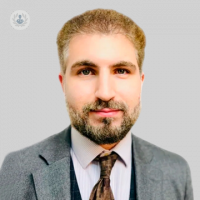Battling bloating: Exploring the impact of Retrograde UES Dysfunction on digestive comfort
Written by:Bloating is a common digestive woe that makes you feel uncomfortable and gassy. While it can have various underlying causes, one often-overlooked contributor is a retrograde upper oesophageal sphincter (UES) dysfunction. In his latest online article, Dr Ahmed Albusoda explores the connection between retrograde UES dysfunction and bloating, shedding light on this lesser-known aspect of digestive health.

Understanding Retrograde UES Dysfunction
The upper oesophageal sphincter (UES) is a muscular ring near the throat at the top of the oesophagus. Its primary function is to prevent air from entering the oesophagus during respiration and to keep food and stomach contents from regurgitating into the throat and mouth. Normally, the UES maintains a tight seal when not swallowing, ensuring the separation of the oesophagus and throat.
Retrograde UES dysfunction is when the UES does not perform its closure function effectively, allowing air to flow backwards from the throat into the oesophagus. This can lead to a range of symptoms, including bloating.
The connection between Retrograde UES Dysfunction and Bloating
- Air swallowing: When the UES does not seal properly, it may allow small amounts of air from the throat to enter the oesophagus and eventually reach the stomach. This air swallowing, also known as aerophagia, is a common cause of bloating. Excess air in the stomach can lead to feelings of fullness and discomfort.
- Incomplete burping: In cases of retrograde UES dysfunction, individuals may find it challenging to burp effectively. Burping helps release built-up gas in the stomach, and when this process is impeded, gas accumulates in the stomach, contributing to bloating.
- Gastroparesis: Retrograde UES dysfunction can sometimes be associated with gastroparesis, a condition where the stomach's emptying is delayed. When the stomach struggles to empty its contents efficiently, it can lead to gas and food remaining in the stomach for an extended period, resulting in bloating and discomfort.
- Gastroesophageal reflux (GERD): Some individuals with retrograde UES dysfunction may experience gastroesophageal reflux disease (GERD), where stomach acid flows back into the oesophagus. This acid reflux can cause irritation and contribute to bloating, often called bloating from gaseous distension.
Managing Retrograde UES Dysfunction and Bloating
- Dietary adjustments: Modify your diet to reduce bloating triggers. Avoid carbonated beverages, limit consumption of gas-producing foods, and consider a low-FODMAP diet to minimise fermentable carbohydrates that contribute to gas production.
- Behavioural changes: Pay attention to eating habits and swallowing patterns. Slow down while eating, chew food thoroughly, and practice mindful eating to reduce the chances of air swallowing.
- Lifestyle modifications: Address lifestyle factors such as stress management, regular exercise, and maintaining a healthy body weight to help alleviate bloating.
- Medications: In some cases, medications can be prescribed to manage bloating symptoms or the underlying condition contributing to UES dysfunction, such as GERD or gastroparesis.
- Speech and swallowing therapy: Speech and swallowing therapy may be recommended to improve UES function for individuals with severe UES dysfunction.
Bloating is a common and often bothersome digestive symptom that can result from various factors. Retrograde UES dysfunction, while not as well-known as other causes of bloating, can play a significant role in these discomforting symptoms. By understanding the connection between UES dysfunction and bloating, individuals can work with healthcare professionals to address the underlying issues, manage their symptoms, and enjoy improved digestive well-being. If you suspect retrograde UES dysfunction as the cause of your bloating, consult a healthcare provider for an accurate diagnosis and tailored treatment plan.
Dr Ahmed Albusoda is an esteemed consultant gastroenterologist. You can schedule an appointment with Dr Albusoda on his Top Doctors profile.


